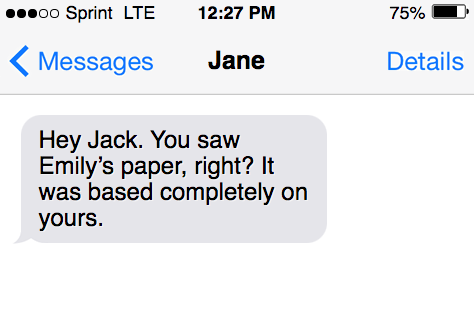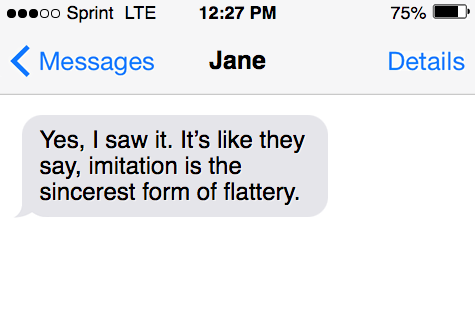What does “imitation is the sincerest form of flattery” mean? And why is it a common expression in American English? Is it a good or negative thing?
Learn more about this idiom…
What does “Imitation is the sincerest form of flattery” mean?
For non-native speakers, English can seem like a tricky language to learn. However, compared to most other languages in the world, the structure of English is far simpler.
Just like every language, the English language also has its common expressions. “Imitation is the sincerest form of flattery” is one of the more popular sayings that most English speakers must’ve used at least once in their life.

The meaning of this expression is quite simple. It means that if someone is imitating or copying you, it’s a compliment. To understand this, let’s break the expression down.
- Imitation – the word ‘Imitation’ means copying. It’s the act of copying someone’s behavior, characteristics, actions, styles, and whatnot. For instance, if a friend of yours dresses precisely like you, he is imitating your dressing style.
- Sincerest – this word is used as an adjective. If you mean or do something, you are said to be sincere.
- Form – this is a quite simpler word. It just means a way of doing something or a method.
- Flattery – flattery means buttering someone up, complimenting or praising them.
Putting these words together, we get the sentence – an imitation is a sincere form of flattery.
This expression can be used in a lot of contexts. However, it usually downplays the act of imitation. When someone imitates you, you can just say that they’re impressed by you and that’s why they’re copying you.
Origins of “imitation is the sincerest form of flattery”
This phrase’s first ever documented use can be traced back to Oscar Wilde.
He used this expression in the following sentence – “Imitation is the sincerest form of flattery that mediocrity can pay to greatness”.
By this, he meant that anything mediocrity that copies something great is often a sincere attempt at flattery. In a sense, it’s good to copy something great, even if it’s mediocre. It can perhaps improve the mediocre thing.
This quote of his is often invoked when artists talk about plagiarism. It seeks to answer questions such as “Is it okay to copy something in order to get inspired?” or “Is it a basic requirement of something artistic to be completely original?”
These questions, however, are part of a very complex discourse.

Examples of “imitation is the sincerest form of flattery” used in sentences
To help you understand this expression better, here are some examples of it being used in a sentence.
Imitation is the sincerest form of flattery if it doesn’t become outright plagiarism.
- Hey Jack. You saw Emily’s paper, right? It was based completely on yours.
- Yes, I saw it. It’s like they say, imitation is the sincerest form of flattery.
- Oh gosh. He copied my whole style in last night’s party. But well, I can’t be offended at that. Imitation, after all, is the sincerest form of flattery.
- Students, imitation is said to be the sincerest form of flattery. But always remember that you have to find your own voice and style in the end.
- It is true that imitation is the sincerest form of flattery. However, you must make sure that you do not profit by stealing someone’s intellectual property.
Synonyms for “imitation is the sincerest form of flattery”
There are no accurate synonyms of this expression. However, you can express it in different ways by using different words. For instance, you can say: by copying someone, you’re only letting the world know how much you admire them.
Or, you can also say: Parroting great speakers is in fact a testament to their greatness.
Depending upon the context, you can pick different words and come up with sentences that reflect the core meaning of the English expression in question.
Who said “imitation is the sincerest form of flattery”?
As mentioned before, it was Oscar Wilde who first used this expression in his writings. After that, however, you can find a lot of authors, filmmakers, writers, etc. using this phrase to get their point across.
Nowadays, it’s one of the most common English expressions out there, and you’ll find a lot of people using it to make a point.
Conclusion
In the end, the words used in the expression “Imitation is the sincerest form of flattery” aren’t important but its meaning is.
This expression negates the negative connotations of the act of copying or emulating.
Usually, people get offended when you start copying them.
This expression makes the point that the fact people are copying you is a compliment. They’re only copying you because they are impressed by you or want to be like you.
Once someone understands this quote, they’ll never get angry at someone stealing their work or copying their mannerisms.
Sources:
- Imitation is the sincerest form of flattery – CIO.com
- Imitation is the Sincerest Form of Flattery – Grammarist
- What Does Imitation is the Sincerest Form of Flattery Mean?
Inside this article
Fact checked:
Content is rigorously reviewed by a team of qualified and experienced fact checkers. Fact checkers review articles for factual accuracy, relevance, and timeliness. Learn more.
Core lessons
Glossary
- Abstract Noun
- Accusative Case
- Anecdote
- Antonym
- Active Sentence
- Adverb
- Adjective
- Allegory
- Alliteration
- Adjective Clause
- Adjective Phrase
- Ampersand
- Anastrophe
- Adverbial Clause
- Appositive Phrase
- Clause
- Compound Adjective
- Complex Sentence
- Compound Words
- Compound Predicate
- Common Noun
- Comparative Adjective
- Comparative and Superlative
- Compound Noun
- Compound Subject
- Compound Sentence
- Copular Verb
- Collective Noun
- Colloquialism
- Conciseness
- Consonance
- Conditional
- Concrete Noun
- Conjunction
- Conjugation
- Conditional Sentence
- Comma Splice
- Correlative Conjunction
- Coordinating Conjunction
- Coordinate Adjective
- Cumulative Adjective
- Dative Case
- Determiner
- Declarative Sentence
- Declarative Statement
- Direct Object Pronoun
- Direct Object
- Diction
- Diphthong
- Dangling Modifier
- Demonstrative Pronoun
- Demonstrative Adjective
- Direct Characterization
- Definite Article
- Doublespeak
- False Dilemma Fallacy
- Future Perfect Progressive
- Future Simple
- Future Perfect Continuous
- Future Perfect
- First Conditional
- Irregular Adjective
- Irregular Verb
- Imperative Sentence
- Indefinite Article
- Intransitive Verb
- Introductory Phrase
- Indefinite Pronoun
- Indirect Characterization
- Interrogative Sentence
- Intensive Pronoun
- Inanimate Object
- Indefinite Tense
- Infinitive Phrase
- Interjection
- Intensifier
- Infinitive
- Indicative Mood
- Participle
- Parallelism
- Prepositional Phrase
- Past Simple Tense
- Past Continuous Tense
- Past Perfect Tense
- Past Progressive Tense
- Present Simple Tense
- Present Perfect Tense
- Personal Pronoun
- Personification
- Persuasive Writing
- Parallel Structure
- Phrasal Verb
- Predicate Adjective
- Predicate Nominative
- Phonetic Language
- Plural Noun
- Punctuation
- Punctuation Marks
- Preposition
- Preposition of Place
- Parts of Speech
- Possessive Adjective
- Possessive Determiner
- Possessive Case
- Possessive Noun
- Proper Adjective
- Proper Noun
- Present Participle
- Prefix
- Predicate



